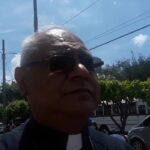
CEED
News and Announcements

Rev. Dr. Miguel Hernandez
The Rev. Dr. Miguel A. Hernández was born in El Salvador and is the Priest-In-Charge of Holy Trinity Episcopal Church in West Orange, NJ, since 2014. He celebrates masses in English and Spanish every Sunday.
Rev. Hernández has a passion for education and for finding ways to contribute to the well-being of his community. At Holy Trinity Episcopal Church, he teaches ESL classes, and he introduces children and young adults to God, Science, and Art in the summer program.
He graduated with a Doctor of Ministry (D. Min.) degree from New York Theological Seminary (May 2018). His project concentrated in the area of God and Science, and it involved creating an awareness campaign of the Water Quality in the West Orange community in NJ.
In connection to this work, he has become a member of The Center for Environmental Exposures and Disease (CEED) Stakeholder Advisory Board at Rutgers University representing the community.
CEED appreciates Rev Hernandez efforts to serve the community on its behalf in local, national and global arenas.
Caminata Ecologica in El Salvador - June 6, 2023
During the Week of Mission Work in El Salvador, Father Miguel Hernandez was informed that numerous religious and civic organizations were organizing an event named: XXIII Caminata Ecologica de El Salvador (Ecological Walk of El Salvador) scheduled for June 6, 2023.
He walked among with other members of the Episcopal Anglican Church in El Salvador and had the opportunity to meet various religious leaders from the Catholic Church, Lutheran Church, and other civic leaders.
There are numerous issues that are causing difficulties to vulnerable communities in El Salvador. Here are some of the most important examples that can be mentioned:
- The mega urbanistic project in Valle de El Angel in San Salvador that will affect the quality of the water to neighboring communities;
- The construction of a water dam in the Rio Sensunapan that will affect indigenous farming communities in Sonsonate;
- The threat of contamination of the rivers Lempa, Paz, and Goascoran due to mining projects in the boarders of El Salvador, Guatemala, and Honduras;
- The arrest of community leaders of Santa Marta in Cabañas who protest against mining order to protect the water from contamination.
It is important to mention that according to a statement made by the organizers of the Ecological Walk, 90% of the superficial water is already contaminated. The potential ecological catastrophe in El Salvador should be a call to action for all to stop development projects in areas where there are aquifers that support life.
Copyright © 2021, Rutgers, The State University of New Jersey


